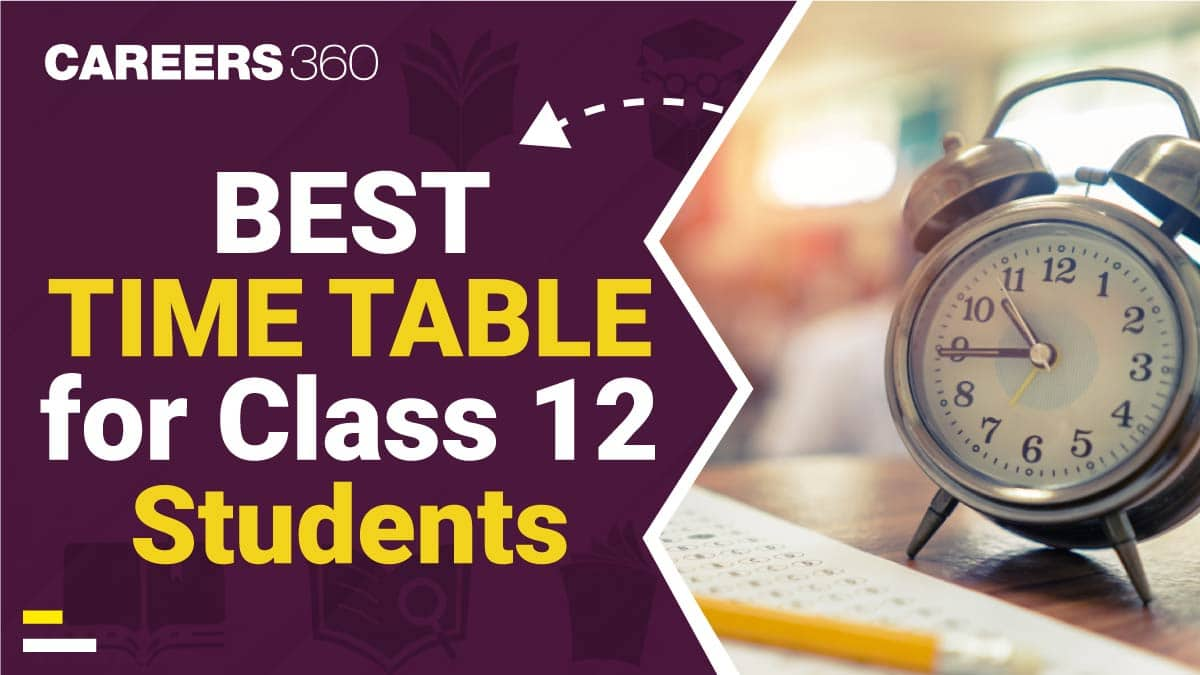Daily Study Routine for CBSE, ICSE & State Boards, Check Best Time Table Plan for Class 12 Students
Students can find a well-structured best Class 12 study timetable tailored to maximise productivity, reduce burnout, and ensure steady progress toward their board exam goals. It’s based on expert advice, topper routines, and proven time-management strategies. This timetable is for all kinds of boards, such as CBSE, ICSE/ISC, or state boards. Students can adopt this best timetable and adjust it according to their school and tuition timings.

Best Time Table for Class 12 Students
Students can follow this best time table for Class 12 students, but it’s not set as the final. We’ve provided a sample best time table for Class 12 students below as a rough guide; feel free to adjust it to match your comfort and rhythm. This best time table for CBSE Class 12 students and other boards is suitable for students across all three streams (PCM, PCB, Commerce).
Time | Activity |
5- 6 AM | Wake up, light exercise, morning notes revision (previous day’s topics) |
6- 7:30 AM | Study tough subjects (Math/Physics) |
7:30- 8 AM | Breakfast break |
8- 2 PM | School and tuition |
2- 3 PM | Lunch and rest |
3- 4:30 PM | Homework or self-study (preferably weaker subjects) |
4:30- 5 PM | Break + light activity |
5- 6:30 PM | Study a conceptual subject (e.g. Chemistry or Biology) |
6:30- 7 PM | Recreation / unwind |
7- 8:30 PM | Revision or problem-solving (alternate subjects) |
8:30- 9 PM | Dinner and leisure |
9- 9:30 PM | Day recap and plan the next day |
9:30- 10:30 PM | Light reading or quiz practice |
By 10:30 PM | Sleep, aiming for 7 to 8 hours of rest |
Plan Smartly: Foundation of a Strong Timetable
Audit routine: Note school timings, tuition, breaks, extracurricular activities, meals, and then fill in study slots realistically.
Set clear goals: Break the syllabus into weekly/monthly milestones, including concept mastery, NCERT practice, and chapter revision
Prioritise subjects: Dedicate more time to challenging subjects like Maths or Physics, while regularly touching theory-heavy subjects like Biology or English
Check sample papers for practice
Effective Study Blocks & Breaks
Use Pomodoro-like blocks: study for 25-50 minutes, then take a 5-10 minute break; after 3-4 cycles, take a longer break of 15-30 minutes
Incorporate daily revision: 30‑45 minutes at the end of each day to reinforce what you studied
Include a weekly review: Sundays can be used for a recap, test practice, and planning the next week
Weekly Layout Based on CBSE Toppers
Monday to Friday: Focus each day on specific subjects (e.g., Maths on Monday, Physics on Thursday, etc.) and include daily brief revisions
Saturday: Full-length mock test (3-4 hrs), followed by mistake analysis and revision of weak areas
Sunday: Light study or complete rest with recap and planning for next week
CBSE Board 10th Toppers Interview
Key Strategies to Boost Efficiency
Morning Power Hour: Use the early morning for intensive study on the hardest topics
Interleaving & Spaced Practice: Mix up subjects and revisit topics regularly rather than cramming
Track Progress: Use a planner or app to monitor daily achievements and adjust the plan and revise based on progress
Limit same-subject sessions: Keep duration for any single subject to a max of 1-2 hours to avoid fatigue
Maintain sleep & wellness: 7-8 hours of sleep, hydration, exercise and mental breaks are non-negotiable
Final Month (Last 30 Days) Strategy
Begin daily study at 5:00–5:30 AM, continue till 10:30 PM with a structured break
Prioritise NCERT exercises and complete sample papers daily.
Last 5-7 days: major revision and repeat difficult topics.
Use leftover time for mock tests under timed conditions to simulate real exams
Consistency matters far more than intensity: it’s the regular, daily effort that yields lasting progress, not spontaneous marathon sessions. At the same time, remain flexible; if you miss a day, simply reschedule your session instead of halting your momentum or being hard on yourself.
Questions related to CBSE Class 12th
On Question asked by student community
Hello
You will be able to download the CBSE Previous Year Board Question Papers from our official website, careers360, by using the link given below.
https://school.careers360.com/boards/cbse/cbse-previous-year-question-papers
I hope this information helps you.
Thank you.
Hello
You will be able to download the CBSE Pre-Board Class 12 Question Paper 2025-26 from our official website by using the link which is given below.
https://school.careers360.com/boards/cbse/cbse-pre-board-class-12-question-paper-2025-26
I hope this information helps you.
Thank you.
Hello,
Yes, it's completely fine to skip this year's 12th board exams and give them next year as a reporter or private candidate, allowing you to prepare better; the process involves contacting your current school or board to register as a private candidate or for improvement exams during the specified
HELLO,
Yes i am giving you the link below through which you will be able to download the Class 12th Maths Book PDF
Here is the link :- https://school.careers360.com/ncert/ncert-book-for-class-12-maths
Hope this will help you!
Hello,
Here is your Final Date Sheet Class 12 CBSE Board 2026 . I am providing you the link. Kindly open and check it out.
https://school.careers360.com/boards/cbse/cbse-class-12-date-sheet-2026
I hope it will help you. For any further query please let me know.
Thank you.
Applications for Admissions are open.
As per latest syllabus. Physics formulas, equations, & laws of class 11 & 12th chapters
JEE Main Important Chemistry formulas
Get nowAs per latest syllabus. Chemistry formulas, equations, & laws of class 11 & 12th chapters
JEE Main high scoring chapters and topics
Get nowAs per latest 2024 syllabus. Study 40% syllabus and score upto 100% marks in JEE
JEE Main Important Mathematics Formulas
Get nowAs per latest syllabus. Maths formulas, equations, & theorems of class 11 & 12th chapters
